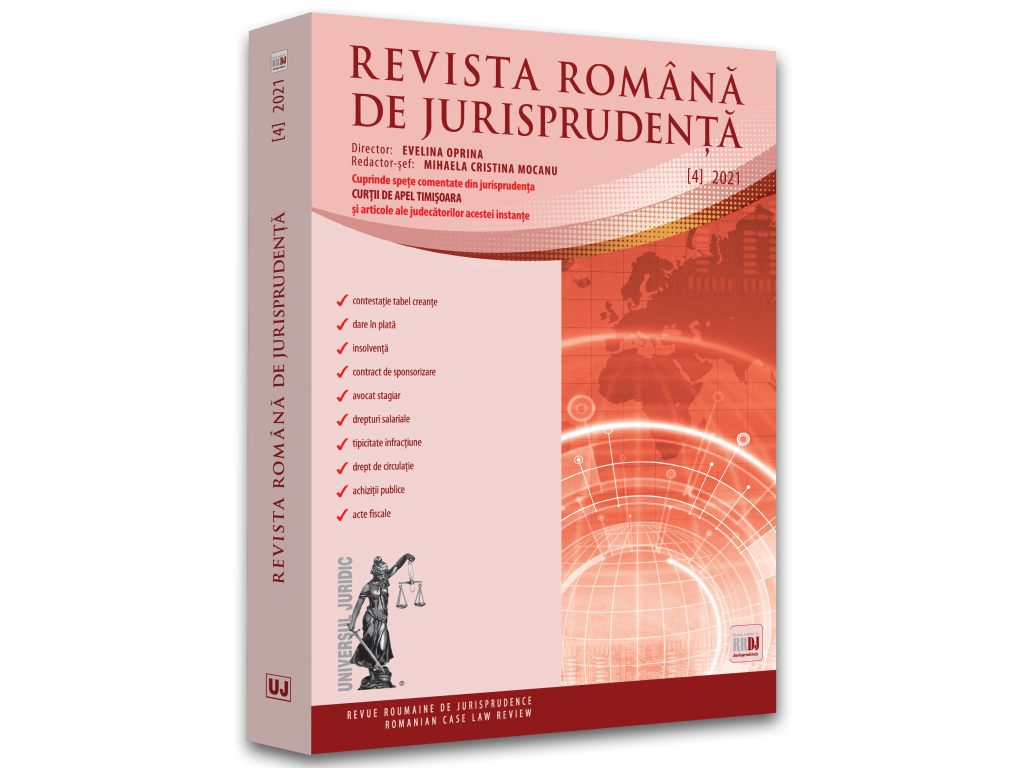Salary entitlements claimed by staff of the Timis Sanitary Veterinary and Food Safety Directorate. Legality of the limitation of the bonus for particularly dangerous conditions.
DREPTUL MUNCII ŞI SECURITĂŢII SOCIALE
Abstract
The plaintiff's request for an increase for particularly dangerous conditions in excess of the percentage laid down for the institution's staff, principally in the amount of 75% and, in the alternative, in the amount of 50%, denies the validity of the procedure followed in applying the provisions of G.D. No 917/2017, a unilateral administrative act of a regulatory nature adopted precisely in order to apply Article 23 and Annex VIII of Framework Law No 153/2017, as is explicitly stated both in the preamble and in its content.
It is not possible to claim that the legal procedural route should be abandoned and that the court should be called upon to take the place of the employer and the employees' representatives and to make personal assessments of the amount of the bonus to which the plaintiff is entitled in the light of the conditions in which she works. Only the authorising officer, in consultation with the trade unions or, where appropriate, the employees' representatives, shall nominate the staff benefiting from the bonus by job, category of staff and determine the concrete size of the bonus as well as the conditions for granting it (Article 3 and Annex No 3, Article 9 of GD No 917/2017).
Given that the administrative procedure prior to the determination of the pay increase for particularly harmful conditions was not annulled and that there was no evidence that it was affected by any irregularity, and that, on the contrary, the entire preliminary administrative procedure ended with the grant of the pay increase in question at a rate close to that claimed by the employees' representative, the plaintiff does not have the option of applying to the court for a review of the criteria laid down in Article 2 of Annex No. 3 to the Regulation for determining the actual bonus within the legal percentages in a framework other than the one regulated by the primary law through Law No. 153/2017 and transposed into the contents of GD No. 917/2017.
Individualization of the percentage of the basic salary, between the legal limits – minimum and maximum – to be paid to employees by way of bonus for working conditions, according to GD no. 917/2017, is the prerogative of the employer, and this operation of assessing the amount of the bonus that may be granted cannot be censured by the courts, provided that there has not been proven the non-fulfillment of legal conditions of form or content in the course of the procedure leading to the annulment of its amount, and the bonus was established within the legal perimeter provided for in the Regulation.
Given that the new salary law establishes in unequivocal terms, through the provisions of Article 23 of the law, that both the specific amount of the bonus for working conditions and the conditions for granting it shall be established by regulation drawn up by the coordinating ministry, it is noted that the legal provisions contained in Article 3 of the regulation approved by GD No 917/2017, which make the granting of bonuses conditional on the amounts provided for staff costs approved by the annual budget, acquire legal value superior to the administrative act which enshrines them, as long as they are supported by organic law.
In these circumstances, having regard to the benchmarks provided by the primary law in the field of staff salaries within the occupational family of budgetary functions „Administration”, the Court finds that the employer could not have established the granting of allowances in disregard of the legal limitations manifested on a twofold level, on the one hand limitations determined by the limits determined by the amounts provided for staff expenditure approved by the annual budget, and, on the other hand, limitations imposed by the provision of the maximum value ceiling of 30% of the amount of basic salaries, established by Article 25 para. (1) of Law no. 153/2017.
At the time the bonus was granted to the plaintiff, there were certain categories of staff in the institution who were entitled to the 30% bonus, but the dynamics of social relations brought about by successive legislative amendments included the plaintiff among the beneficiaries of the bonus for particularly dangerous conditions, and the actual amount of the bonus granted could not be established by neglecting the rights recognised in favour of the other categories of employees, because whether or not the ceiling of 30% of basic salaries is exceeded is assessed by reference to the total amount of bonuses, compensation, allowances, bonuses, premiums and allowances, including those for food and holiday pay, granted cumulatively for the total budget for each authorising officer, and not individually, by direct reference to the monthly salary received by each employee belonging to the same professional category. If discrimination has occurred by operation of law, then the court does not have the power to annul or refuse to apply provisions having the force of law, considering them to be discriminatory, and to replace them with judicially created rules or with provisions contained in other normative acts, it being the exclusive right of the law to regulate different rules concerning the determination of salary rights in consideration of distinct legal situations (Decisions No 818, 819, 820 of 3 July 2008 of the Constitutional Court).








